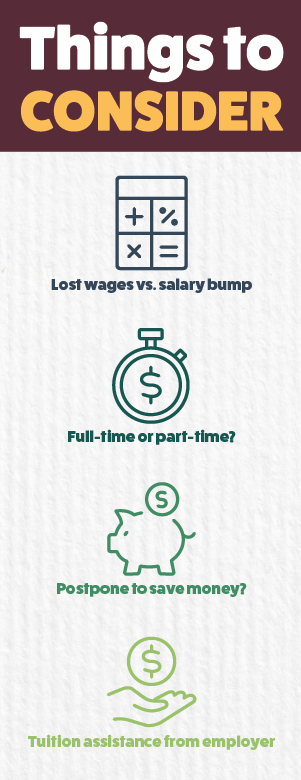
Get stories and expert advice on all things related to college and parenting.

You say “love you” to your college student and hang up the phone, your eyes popping a bit. Did they really just announce that they're considering graduate school?
 Questions ricochet in your mind. What about the lost wages if they go back to school? Does this guarantee a better paying job? Would it be easier financially to enroll in a part-time program?
Questions ricochet in your mind. What about the lost wages if they go back to school? Does this guarantee a better paying job? Would it be easier financially to enroll in a part-time program?
Wait a minute... Will they have to move back home? And if they do, will they ever be able to afford to move out again??
It’s okay. Breathe! You’ll get through this — both of you.
As with undergraduate choices, parents can play an important role in the grad school decision. In order to be a good sounding board, though, you need to be current on some facts about returning to school for a graduate management education.
If they decide to enroll in a full-time program, then yes, they’ll most likely have to leave their current full-time job in order to attend classes and complete the rigorous program requirements. The good news is they’ll be done in two years and most likely return to the workforce earning an income significantly higher than they previously received.
Speaking of returning to the workforce…
Ahh…if only life came with such guarantees! However, while not a guarantee, according to Michigan State University and the Collegiate Employment Research Institute’s Recruiting Trends 2015-2016 Report, 47 percent of employers seeking to hire MBAs expected to increase hiring over the previous year. In fact, the MBA is the most sought-after degree among American corporate recruiters searching for job candidates with advanced degrees.
As for starting salaries, the GMAC 2016 Corporate Recruiters Survey Report found new MBA graduates earning on average $105,000 — more than twice the starting salary of new grads with just a bachelor's.
If your student has sights set on an even higher starting salary, they may want to attend one of the top ranked schools, where — according to U.S. News & World Report — some schools see an average starting salary upwards of $140,000.
That’s quite a range in starting salaries, and you can bet there is a corresponding range in tuition costs. As the parent, you may want to put aside any emotional response to those numbers and focus on the facts. How much is this really going to cost? What is the expected return on investment? Don’t forget to include those lost wages in your calculation, as well as the interest paid out over the life of any student loans. And don’t think just short-term starting salary; what does the long-term picture look like for earnings over the course of their career?
Okay, now that you and your student have some idea of both the costs and benefits…
That sounds financially more manageable, doesn’t it? This could be a viable option, especially if their current employer offers some form of tuition assistance, but again — make sure they do their research. In the case of employer assistance, it’s important to understand not only the contribution their employer will make, but also the commitment they will need to make to their employer in return. Determine the amount of assistance:
And what are the company’s terms for financial assistance? Is there a minimum acceptable grade your student must earn? Will they have to pay in advance and then be reimbursed by the company? Will they be required to stay with their current employer for a minimum number of years after earning their degree?
Although financially more appealing, entering a part-time program while working full-time has other challenges associated with it, so be sure to discuss these with your student as well. For example:
As you talk through options with your student, the right path may become clear. Regardless of the route they choose, however, help them understand the financial realities of their choice and make plans to address those obligations, both in the short-term as well as the long-term.
That might mean postponing school while they save up money for tuition or to pay off current debt. Or, yes, it may even involve quitting their job and moving back home for a while. But since neither of you want your student to be living in their childhood room into their 40s, setting realistic long-term financial goals will benefit you both. Three things to consider:
Making the decision to pursue a graduate management education can be difficult. Regardless of your student’s ultimate decision, knowing you are there to lend guidance and wisdom will give them confidence to explore options and make the choice that’s right for them.
